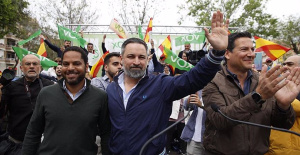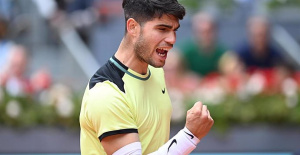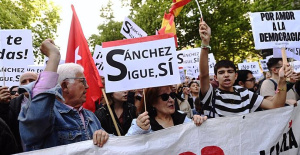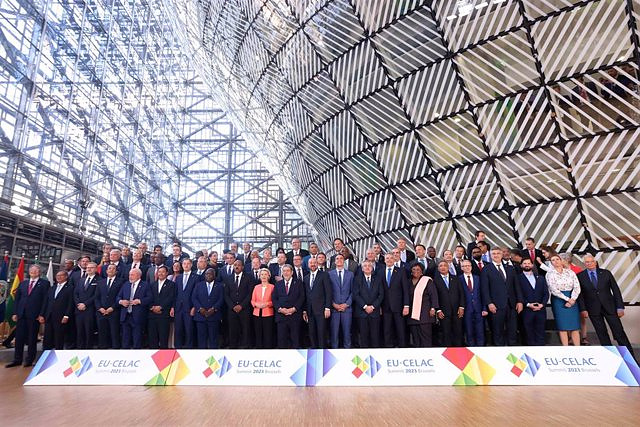BRUSSELS, 18 Jul. (EUROPEAN PRESS) -
The leaders of the European Union and the Community of Latin American and Caribbean States (CELAC) have agreed on Tuesday a final joint declaration without Nicaragua that expresses concern about the war "against" Ukraine, but avoids mentioning Russia or condemning the military aggression to bridge differences with Latin American countries.
"We express our deep concern about the ongoing war against Ukraine, which continues to cause immense human suffering and is exacerbating existing fragilities in the world economy, constraining growth, increasing inflation, disrupting supply chains, increasing energy insecurity and food and raising the risks for financial stability", states the final declaration at the summit.
In any case, in order to garner the support of Latin American partners, it avoids the harsher language with which Europe usually refers to the Russian war of aggression in Ukraine. The final text has gone ahead as a bloc declaration with a footnote indicating that it was supported by all the countries, "with one exception", in reference to Nicaragua, which it does not name.
Likewise, in the final document the EU and CELAC express their support for "all diplomatic efforts" aimed at achieving "a just and lasting peace in accordance with the Charter of the United Nations".
"It was not the object of this summit, and it was not what occupied us at this summit, and the problem of Ukraine did not stop us from advancing on the things that we had to advance", stressed the Argentine president, Alberto Fernández, in a round post-summit press release. And although he has acknowledged that there are "some dissident voices" on the continent, he has denied that Latin America has a "resentment" regarding Ukraine, when the "most" CELAC countries denounced the Russian invasion at the United Nations.
For the pro tempore president of CELAC and prime minister of Saint Vincent and the Grenadines, Ralph Gonsalves, on the issue of Ukraine it cannot be that the same countries that invoke the UN principles in Ukraine are the same ones that "historically" have used force against "small and poor" countries, for which reason he has asked Europe to "get rid of hypocrisy" and "apply the same principles of the United Nations clearly and objectively". "We are not children," said the Caribbean leader.
Despite the fact that Europeans and Latin Americans wanted to avoid tensions and it was ruled out inviting the Ukrainian president, Volodimir Zelenski, so that he would not overshadow the appointment, the conflict in Ukraine has been the focus of the negotiations of these two days of summit. Until the last moment, work has been done to overcome the obstacle that Nicaragua, Venezuela and Cuba have represented for their refusal to condemn the Russian invasion of Ukraine, with the Central American country being the main stumbling block in the end to close a common text.
Beyond Ukraine, at a press conference, the President of the European Council, Charles Michel, has claimed that the document agreed after the summit between the EU and CELAC is an "ambitious declaration" that exemplifies the "new dynamic" that the EU wants to generate with the countries of Latin America, after a period of eight years without a high-level summit.
From the first meeting between European and Caribbean leaders since 2015 comes the commitment to hold regular leaders' summits every two years, the next being in the CELAC region in 2025. To this end, both regions have agreed on a roadmap and the ministers Foreign Affairs will regularly monitor relations, thus paving the way for high-level meetings.
For his part, Fernández has celebrated that Europe embraces issues that concern the Latin American continent, such as avoiding "extractivism" relations. "It took us five centuries to talk about extractivism with Europe, but we have succeeded," he stated, who has spoken that the summit has "fulfilled the expectations" of both blocks.
Gonsalves has highlighted that the declaration includes 41 paragraphs and many issues that concern Latin America and the Caribbean, such as mobilizing investments to combat climate change. Despite the fact that it has been "difficult" to reach the final communiqué, the summit serves to "renew the friendly relationship" between the EU, Latin America and the Caribbean.
NO DEADLINES FOR MERCOSUR
On the commercial front, the leaders affirm their interest in "open and fair" relations and their determination to "strengthen and develop" trade and investment ties, a context in which they applaud the advances to conclude the modernization of the agreements of the EU with Chile and Mexico "in the coming months".
However, the text lowers the expectations of Spain and the European Commission for achieving a definitive "impetus" for the agreement with Mercosur at this summit and limits itself to "taking note" that the "work is still underway."
In the subsequent press conference, the president of the European Commission, Ursula Von der Leyen, expressed her confidence that the blockade could be overcome after listening to the parties, but the leaders of France, Emmanuel Macron; from the Netherlands, Mark Rutte; and from Ireland, Leo Varadkar, have made their reservations clear during the two days of the summit.
On the side of the Southern Cone, they are also open to closing the pact before the end of the year, but the Brazilian president warned the EU that he cannot base the negotiations on "threats", while the Argentine president has warned that they must win "all", "because if one wins and another loses it is a joke, not an agreement".
DENOUNCEMENT OF SLAVERY
On the other hand, the declaration includes a mention of slavery, another of the delicate issues in the drafting of the text. "We deeply recognize and regret the untold suffering inflicted on millions of men, women and children as a result of the cross-Atlantic slave trade," the text reads.
The leaders have expressed their "full support" for the principles and elements contained in the Durban Declaration and its Program of Action, "including the recognition that slavery and the slave trade" were "horrible tragedies in the history of mankind." , not only because of its abominable barbarism but in terms of its magnitude, organized nature and, especially, its denial of the essence of the victims".
They constituted "a crime against humanity", they have finished off. Thus, the CELAC countries have referred to the ten-point Restorative Justice Plan of the Caribbean Community (CARICOM), the statement specifies. Said plan includes, among other things, a "full formal apology" to the descendants of slaves and their repatriation to the countries of their ancestors if they wish, as well as the cancellation of the debt.
787141.1.260.149.20230718160803

 Exploring Cardano: Inner Workings and Advantages of this Cryptocurrency
Exploring Cardano: Inner Workings and Advantages of this Cryptocurrency Seville.- Economy.- Innova.- STSA inaugurates its new painting and sealing hangar in San Pablo, for 18 million
Seville.- Economy.- Innova.- STSA inaugurates its new painting and sealing hangar in San Pablo, for 18 million Innova.- More than 300 volunteers join the Andalucía Compromiso Digital network in one month to facilitate access to ICT
Innova.- More than 300 volunteers join the Andalucía Compromiso Digital network in one month to facilitate access to ICT Innova.-AMP.- Ayesa acquires 51% of Sadiel, which will create new technological engineering products and expand markets
Innova.-AMP.- Ayesa acquires 51% of Sadiel, which will create new technological engineering products and expand markets Unicaja lifts its first FIBA Champions League at the expense of Lenovo Tenerife
Unicaja lifts its first FIBA Champions League at the expense of Lenovo Tenerife Abascal (Vox) criticizes that Sánchez is "victimizing" himself and calls for elections after his possible resignation
Abascal (Vox) criticizes that Sánchez is "victimizing" himself and calls for elections after his possible resignation Carlos Alcaraz reaches the round of 16 in Madrid without breaking a sweat
Carlos Alcaraz reaches the round of 16 in Madrid without breaking a sweat Some 5,000 people demonstrate in front of Congress for democracy, hours before Sánchez's decision
Some 5,000 people demonstrate in front of Congress for democracy, hours before Sánchez's decision How Blockchain in being used to shape the future
How Blockchain in being used to shape the future Not just BTC and ETH: Here Are Some More Interesting Coins Worth Focusing on
Not just BTC and ETH: Here Are Some More Interesting Coins Worth Focusing on UPV students build a prototype of a wooden house to move to Equatorial Guinea
UPV students build a prototype of a wooden house to move to Equatorial Guinea The UA opens the call for the Impulso 2024 Awards for the best innovative business initiatives
The UA opens the call for the Impulso 2024 Awards for the best innovative business initiatives ALI, virtual assistant from Alicante, internationally recognized by the OECD
ALI, virtual assistant from Alicante, internationally recognized by the OECD Retrópolis brings the golden age of video games and computing to the UPV
Retrópolis brings the golden age of video games and computing to the UPV A million people demonstrate in France against Macron's pension reform
A million people demonstrate in France against Macron's pension reform Russia launches several missiles against "critical infrastructure" in the city of Zaporizhia
Russia launches several missiles against "critical infrastructure" in the city of Zaporizhia A "procession" remembers the dead of the Calabria shipwreck as bodies continue to wash up on the shore
A "procession" remembers the dead of the Calabria shipwreck as bodies continue to wash up on the shore Prison sentences handed down for three prominent Hong Kong pro-democracy activists
Prison sentences handed down for three prominent Hong Kong pro-democracy activists ETH continues to leave trading platforms, Ethereum balance on exchanges lowest in 3 years
ETH continues to leave trading platforms, Ethereum balance on exchanges lowest in 3 years Investors invest $450 million in Consensys, Ethereum incubator now valued at $7 billion
Investors invest $450 million in Consensys, Ethereum incubator now valued at $7 billion Alchemy Integrates Ethereum L2 Product Starknet to Enhance Web3 Scalability at a Price 100x Lower Than L1 Fees
Alchemy Integrates Ethereum L2 Product Starknet to Enhance Web3 Scalability at a Price 100x Lower Than L1 Fees Mining Report: Bitcoin's Electricity Consumption Declines by 25% in Q1 2022
Mining Report: Bitcoin's Electricity Consumption Declines by 25% in Q1 2022 Oil-to-Bitcoin Mining Firm Crusoe Energy Systems Raised $505 Million
Oil-to-Bitcoin Mining Firm Crusoe Energy Systems Raised $505 Million Microbt reveals the latest Bitcoin mining rigs -- Machines produce up to 126 TH/s with custom 5nm chip design
Microbt reveals the latest Bitcoin mining rigs -- Machines produce up to 126 TH/s with custom 5nm chip design Bitcoin's Mining Difficulty Hits a Lifetime High, With More Than 90% of BTC Supply Issued
Bitcoin's Mining Difficulty Hits a Lifetime High, With More Than 90% of BTC Supply Issued The Biggest Movers are Near, EOS, and RUNE during Friday's Selloff
The Biggest Movers are Near, EOS, and RUNE during Friday's Selloff Global Markets Spooked by a Hawkish Fed and Covid, Stocks and Crypto Gain After Musk Buys Twitter
Global Markets Spooked by a Hawkish Fed and Covid, Stocks and Crypto Gain After Musk Buys Twitter Bitso to offset carbon emissions from the Trading Platform's ERC20, ETH, and BTC Transactions
Bitso to offset carbon emissions from the Trading Platform's ERC20, ETH, and BTC Transactions Draftkings Announces 2022 College Hoops NFT Selection for March Madness
Draftkings Announces 2022 College Hoops NFT Selection for March Madness























